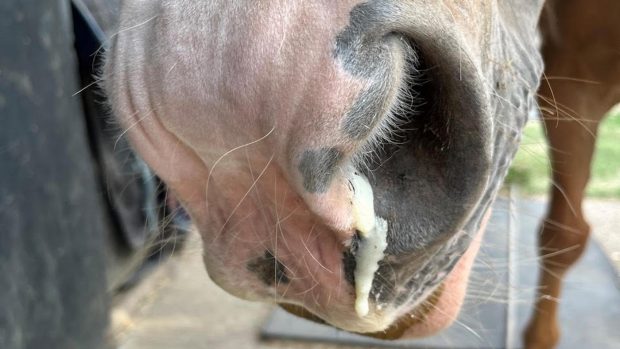Vets are worried that the flu vaccine you buy annually for your horse may increasingly be unable to protect them.
This is the message from the Animal Health Trust (AHT), which has confirmed there have been 19 outbreaks — some affecting over 150 horses — this year, compared with nine or 10 in each of the previous three years.
The AHT are unable to give exact figures but said at least one outbreak this year involved horses that had been vaccinated.
H&H reported last year that manufacturers needed to update products to avoid a potentially crippling flu epidemic — but so far little progress has been made.
Dr Andy Durham of Liphook Equine Hospital, Hants, said the situation was “frustrating”.
There is serious concern that the vaccine is not effective against the current strain of flu.
All UK cases of equine flu since May 2010 have been due to strains known as “clade 2”. But of the four UK vaccinations, not one contains the clade 2 virus, despite suggestions from the OIE (World Organisation for Animal Health) as far back as 2010.
Although manufacturers have provided evidence that their vaccines can protect against the clade 2 strain, vets remain concerned.
“Scientifically, it is not ideal to rely on cross-protection,” said Dr Tim Watson of Waterlane Equine Vets in Stroud, Glos.
“Practically, the existing vaccinations did appear to be working — only one of the nine outbreaks in 2012 affected vaccinated horses — but for how long?”
Dr Andy Durham added: “Despite recommendations, one vaccine was updated this autumn without clade 2.
“Companies are putting their money into propaganda to convince us that updated vaccines work, when they are only coming into line with OIE’s 2004 recommendations. But I believe one manufacturer is close to launching a vaccine with clade 2.”
The AHT’s Dr Richard Newton said the increase in cases of flu may be due to better surveillance and lapsed or out-of-date vaccinations, rather than current vaccines being inefficient.
“Updating vaccines is timely and costly for manufacturers, as significant testing needs to be undertaken,” he said. “Human flu vaccines are updated more readily. Perhaps we need to relax regulations to help speed that process.”




